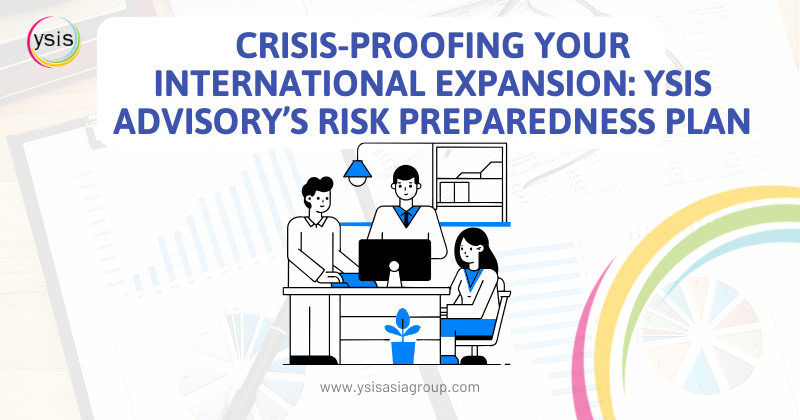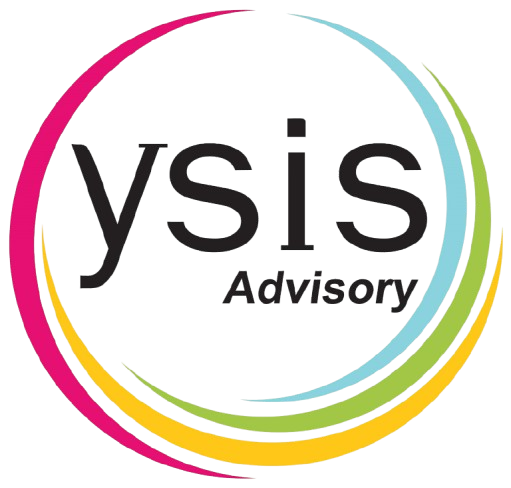
Expanding into new markets is one of the most rewarding steps for any ambitious company. It opens doors to new customers, greater visibility, and long-term growth opportunities. Yet with every international move comes a unique set of risks, political uncertainty, currency fluctuations, supply chain challenges, and unpredictable economic downturns.
Many businesses underestimate these risks, assuming that success in their home market will translate seamlessly abroad. The reality is that without careful planning, even the most promising expansion can become an expensive setback. This is where the importance of risk preparedness comes into play.
At YSIS Advisory, we’ve worked with companies of all sizes navigating cross-border growth. One lesson has proven consistent: businesses that anticipate challenges and plan for disruption are the ones that succeed, even in volatile environments. Crisis-proofing your international expansion is not only about avoiding pitfalls, it’s about building the resilience to turn risks into opportunities.
Why Risk Preparedness Matters in Global Expansion
Global markets are inherently dynamic. A country that looks stable today may experience sudden regulatory changes tomorrow. Consumer trends shift quickly. Political events can disrupt supply chains or trade routes. And global crises, like the pandemic, can completely reshape market realities overnight.
Companies without a risk preparedness plan often scramble to respond reactively, losing valuable time and resources. In contrast, organizations that embed resilience into their expansion strategies are able to adapt quickly, minimize losses, and protect their brand reputation.
Preparedness is not about expecting the worst; it’s about ensuring your company is agile, flexible, and confident when unexpected challenges arise. For businesses expanding abroad, this is the key difference between growth and stagnation.
The Biggest Risks in International Expansion
Every market has its opportunities, but each also carries risks. Below are the most common ones that companies face:
1. Political and Regulatory Shifts
New governments, sudden policy changes, or shifts in trade agreements can impact everything from taxation to compliance requirements. An unexpected regulation can delay operations or significantly raise costs.
YSIS Advisory helps companies anticipate such risks through continuous monitoring, scenario analysis, and regulatory mapping, so that clients are never caught unprepared.
2. Currency Volatility
Currency fluctuations directly affect profit margins. For example, a sudden devaluation of the local currency can turn a profitable venture into a loss-making one.
Solution: Companies should consider hedging, multi-currency strategies, and revenue diversification to cushion the impact.
3. Supply Chain Disruptions
Modern supply chains are global, which makes them vulnerable to border closures, shipping delays, or geopolitical tensions. A single disruption can delay production and damage customer trust.
Solution: Resilient companies build alternative supply lines, invest in digital monitoring tools, and establish contingency stock.
4. Economic Downturns
Markets can face inflation, rising interest rates, or sudden drops in consumer demand. Companies heavily dependent on a single country or sector are the most vulnerable.
Solution: Flexible models and stress-tested financial plans help weather downturns while maintaining long-term stability.
Building a Risk Preparedness Plan
How can companies protect themselves against such uncertainty? A structured preparedness plan is the foundation.
Step 1: Comprehensive Risk Assessment
Every expansion should begin with a detailed risk analysis. This includes evaluating political, financial, and operational threats in the target market.
YSIS Advisory integrates risk assessment into all market entry strategies, helping businesses plan realistically from day one.
Step 2: Market and Revenue Diversification
Relying too heavily on one market can expose businesses to unnecessary risks. Diversification spreads exposure and provides a safety net when one region struggles.
Step 3: Strong Local Partnerships
Local partners act as early warning systems for market shifts and help businesses adapt faster. YSIS Advisory connects clients with reliable, pre-vetted partners that provide not only operational support but also valuable cultural and regulatory insights.
Step 4: Flexible Business Models
Agility is a competitive advantage. Companies that build scalable, cloud-based, and hybrid operational models can quickly adjust to market conditions without heavy losses.
Step 5: Crisis Response Protocols
Preparedness means having a clear playbook for when things go wrong. This includes communication chains, leadership responsibilities, and simulation testing. Companies that practice crisis response are always faster and more confident when real disruptions occur.
Learning from Global Expansion Patterns
From past studies, it shows that international expansion rewards companies that prepare thoroughly and punishes those that underestimate uncertainty. Businesses that invested in risk analysis before entering new markets often achieved smoother entry, stronger local adoption, and faster profitability. On the other hand, companies that rushed in without understanding political climates, cultural dynamics, or financial exposure frequently faced costly setbacks. At YSIS Advisory, we’ve seen this contrast play out repeatedly, organizations with structured preparedness are not only more resilient but also more confident in seizing growth opportunities when conditions shift.
Turning Risks Into Opportunities
Crisis-proofing is not about building walls, it’s about creating pathways for growth. Political shifts may drive competitors out, leaving market share for agile players. Currency fluctuations may create opportunities for cost-efficient production. Even downturns can allow prepared businesses to acquire assets or competitors at lower valuations.
By viewing risk through a strategic lens, companies can move beyond survival to achieve competitive advantage. YSIS Advisory’s role is to guide organizations in building resilience so they are not only shielded from disruption but also positioned to grow stronger in uncertain times.
How YSIS Advisory Supports Risk Preparedness
While no company can eliminate risk entirely, YSIS Advisory provides the expertise to manage it effectively. Our approach combines:
- Risk Intelligence – Continuous monitoring of political, financial, and regulatory developments.
- Strategic Planning – Embedding risk management into market entry strategies.
- Local Partnerships – Connecting clients with trusted in-market partners.
- Execution Support – Assisting with on-the-ground adjustments during disruptions.
This end-to-end advisory approach ensures that businesses expanding abroad are not navigating risks blindly. Instead, they enter new markets with a clear plan, stronger resilience, and greater confidence.
International expansion is a high-reward move, but it is never risk-free. Political changes, supply chain disruptions, and economic instability are challenges that every business must anticipate. A well-prepared company doesn’t just survive these challenges, it thrives despite them.
A risk preparedness plan is not optional; it is essential for sustainable global growth. Companies that treat resilience as a core strategy gain a long-term edge, protecting both their operations and their reputation. With YSIS Advisory’s guidance, businesses can design expansion strategies that are flexible, future-ready, and crisis-proof.Read more about our service in Thailand at https://ysisadvisory.com/services/. If you’d like a free 30-minute complimentary marketing consultation, please reach out to natt@ysisasiagroup.com.
Get in Touch
Ready to take the next step? Let's discuss how we can help you expand into new markets and achieve your growth objectives.
